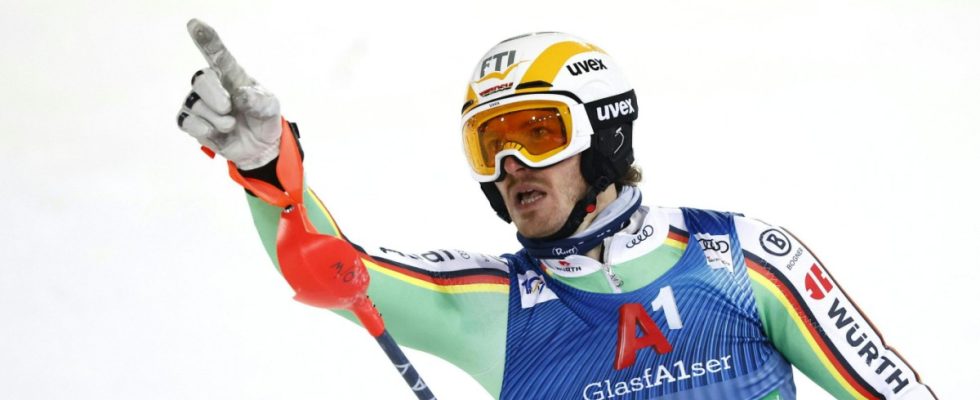It was a wet evening in Styria, and that wasn’t just due to the traditionally thirsty audience. The second round of the night slalom was just taking place in Schladming, and drops were running down the racers’ ski goggles. For most people, skiing in the rain feels as exciting as a stale bottle of sparkling wine, but slalom professional Linus Straßer is not like most people. Shortly before he plunged into the slope from Schladming for the second time that evening, he explained his perception of weather matters. “Those were always my best games in football when things got really dirty,” said the man from TSV 1860 Munich. “So: I like it.”
At the German Ski Association you can be happy that Linus Straßer has chosen slalom sports. Shortly after his meteorological remarks, the 31-year-old curved through the tilting bars on the Planai slope under the Schladming floodlights – and won his second race within four days. “It’s really simple, especially for me,” he said afterwards at the Bavarian Radio microphone. “I stand really well over the skis, I have a really good feel for my position.” He still seemed completely in control of himself and his discipline, and was sober in his sporting analysis. As if he hadn’t quite realized what he had just achieved.
After the success not far from his adopted home in Kitzbühel on Sunday, Straßer has now achieved something that no other German skier has achieved before him: winning the slaloms in Kitzbühel and Schladming in one season. “I’m currently savoring the momentum,” said Straßer, while the Schladming audience in the background started the night’s party. A Munich lion wins the double, yes you’re crazy!
The race on Wednesday evening had a lot of excitement to offer – right from the start of the first run. Strasser had an unfinished business to settle with this tendency. He won here in 2022, but exactly a year ago to the day he was eliminated at the second gate in the first round in Schladming by a threader, the bitterest fate for the slalom skiers. This time he got the early start number three in the draw – and that turned out to be a stroke of luck. By the end of his first ride, the rain had stopped over Schladming, he drove largely in the dry, as dry as snow can be – and left a flawless track on the slope. The best slalom skier so far this season, Manuel Feller from Austria, came shortly after him – and comparatively dripping and crossed the finish line about a second behind Straßer. The following applies to snow: the wetter it is, the less it slips.
“I heard the last split time,” says Straßer, “54 hundredths, that should be enough.”
However, it was not a success for which Straßer would have to thank any powers above. In run two he proved it, as the rain was now dripping onto his ski goggles. Straßer was the last one up, a dubious honor in the slalom when you were the fastest in the first half: the pressure could hardly be greater than in these moments alone up in the start house. 30,000 people were waiting for him below. In the TV commentary booth before Straßer’s final start, Bernd Schmelzer let it be known that he himself was close to a nervous breakdown, which his co-commentator – the former Schladming winner Rainer Schönfelder – knew how to prevent. It would also have been a shame for this duo, which is worth listening to. Then the time had come – and Straßer threw himself into the Planai.
Once again he managed a practically perfect ride, without any noticeable mistakes, unlike Feller, who came fifth on the day and is now slightly ahead of Straßer in the overall ranking of the slalom specialists. The Munich native, meanwhile, carved rhythmically and playfully from pole to pole, almost as if he were in the middle of a training run. Shortly before the finish, he was half a second ahead of the Norwegian Timon Haugan, who was ahead of Clément Noël (France), as stadium spokesman Stefan “Steff” Steinacher announced. “I heard the last interim,” said Straßer. And thought to myself: “54 hundredths, that should be enough.” He still lost two tenths, but nobody was interested in that in the Schladming rain. Five goals later, the ski lion was the first German double winner to cross the finish line.

